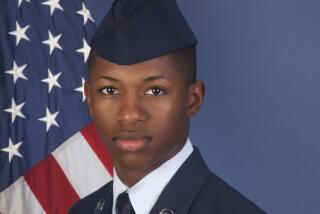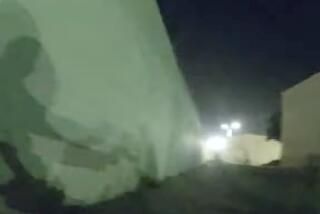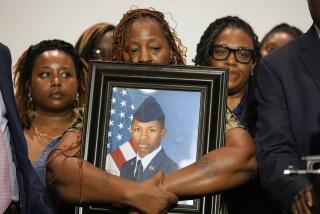Witness who taped shooting backs airman’s version
The bystander who filmed a San Bernardino County sheriff’s deputy shooting an unarmed airman after a high-speed chase last year testified Tuesday that he clearly heard the officer order the man to get up from the ground “several times” just before the officer fired and that he never saw the airman threaten or rush the deputy.
But the lead attorney for former Deputy Ivory John Webb Jr., who is on trial for attempted voluntary manslaughter and assault with a firearm in the shooting of 23-year-old Elio Carrion, challenged the recollections of the cameraman, Jose Luis Valdes.
Webb’s attorney noted that at one point Valdes was represented by the same attorney Carrion hired to handle his lawsuit, appearing to question whether Valdes’ was sympathetic to Carrion’s perspective.
On the night of the shooting, Carrion was a passenger in a Corvette driven by a high school friend, who led Webb on a nighttime pursuit topping speeds of 100 mph that ended when the driver lost control in Chino.
Prosecutors say Webb shot Carrion three times as the airman followed the deputy’s order to “get up.” Webb’s attorney has argued that his client saw Carrion reach into his jacket and thought he was going to pull out a weapon. Webb has pleaded not guilty to all charges.
Valdes, a used-car salesman who lived across the street from where the Corvette crashed, testified that he watched Webb and Carrion argue for three minutes before he began filming. Carrion was sprawled on the ground outside the car.
Valdes testified that he ran inside to grab his camcorder after watching the officer shouting curse words and “throwing ... many kicks” at Carrion or in his direction.
Valdes, who spoke through a Spanish translator in the San Bernardino courtroom, told prosecutor R. Lewis Cope that the night was so clear that he could see Carrion’s hands as the airman followed the deputy’s command to “get up.”
He said he never saw the airman move his hands toward the officer.
But during a brisk cross-examination, Webb’s lead attorney, Michael Schwartz, read back Valdes’ initial statements to police when he said it was so dark he doubted the officer could see into the Corvette, where the driver was still sitting.
Schwartz also noted that Valdes initially told detectives he ran to get his camera when he saw Carrion getting out of the car.
“It was a confusing night,” Valdes responded.
Schwartz questioned why Valdes had never told police about the exchange between Webb and Carrion, or the alleged kicks by Webb, that he said he witnessed before recording the incident.
Valdes retorted: “Have you ever seen a police officer shoot someone without a reason? Anyone would get nervous.”
Schwartz also raised questions about the condition of Valdes’ Sony digital camcorder, which provided a dark, grainy recording of the incident. Valdes testified that he had never cleaned the camcorder or its lens in the six years he owned it, even after using it during trips to the desert and the beach in Hawaii.
Earlier Tuesday, Carrion wrapped up his testimony with a critique of Webb’s conduct and professionalism.
The airman, who has been unable to return to patrol duties because of his injuries but is back at Barksdale Air Force Base in Louisiana on desk duty, emphasized the swearing and shouting by Webb on the night he was shot.
Carrion, who was home on leave after a six-month tour in Iraq when the incident occurred, was asked by the prosecutor why he shouted, “Don’t talk to me like that!” at Webb while he was held at gunpoint.
Carrion testified that every time Webb said something during the traffic stop, it had a vulgarity in it: “He just kept repeating it over and over.”
“In the military, if you use any profanities while performing your duties, you get written up, no matter if you’re talking to an enlisted person, an officer or a regular civilian,” Carrion said in testimony before the jury of eight men and four women.
“No matter how they talk to you, you’re asked to be professional at all times. An officer should never use profanities while performing their duties,” he said.
Cope asked Carrion, who was intoxicated the night he was shot, why he used a vulgarity when he shouted at Webb that he had “served more time than you” in law enforcement and military, if the officer’s language bothered him.
“I thought the way to get him to listen [was] if I threw a cuss word at him,” Carrion testified.
The senior airman said Webb’s voice dropped from a “high-pitched” tone to a calm one just before he was shot when Carrion heard him say, “OK, get up, get up.”
Webb’s softer tone was important to him, Carrion continued, because he thought he had succeeded in calming the officer down -- and that led him to follow what struck him as an odd command to get up off the ground.
“When he told me to ‘get up,’ he took more control -- like he knew what he was doing,” the airman testified.
Schwartz tried Tuesday to chip away at Carrion’s credibility by highlighting inconsistencies between his testimony this week and the airman’s recollections immediately after the incident and in the preliminary hearing in August.
Although Carrion has insisted that he told Webb several times he was unarmed, he acknowledged that he never made that statement in the taped portion of the incident.
Valdes testified that he recalled hearing Carrion tell the officer he was unarmed.
Schwartz also challenged how Carrion could clearly recall statements he made in the hospital to detectives 1 1/2 years ago, yet he testified that he did not remember Webb telling him three times to put his hand on the ground before the shooting.
Outside the courthouse, Carrion said he was looking forward to heading back to Louisiana, where he plans to take tests to move up to the next rank as an Air Force staff sergeant, a promotion he said he missed by three points in the last round.
“I want to make it a career,” he said of his service in the Air Force, after alluding to his fear that the impairments from the bullet wounds could keep him from passing all the necessary medical tests.
Carrion plans to fly back to Louisiana on Thursday but could be recalled by attorneys.
More to Read
Sign up for Essential California
The most important California stories and recommendations in your inbox every morning.
You may occasionally receive promotional content from the Los Angeles Times.











